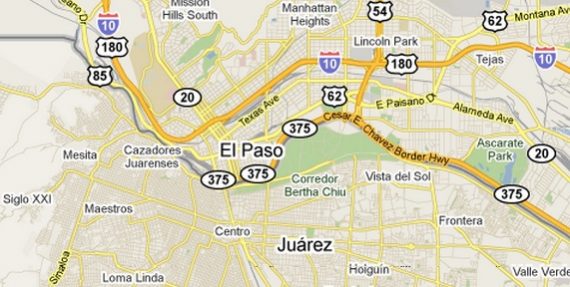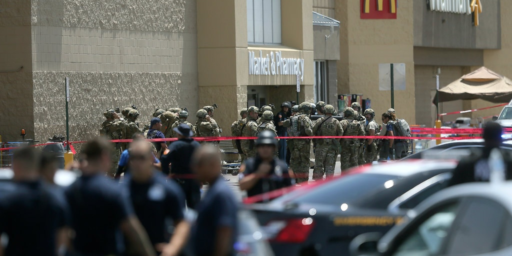A Tale of Two Cities: El Paso and Ciudad Juárez
Despite assertions that the violence in Mexico is spilling over the border, we find a rather stark comparison of two key border cities.
 Via the El Paso Times (El Paso murders, crime rate overall fall) we have the factoid of the day:
Via the El Paso Times (El Paso murders, crime rate overall fall) we have the factoid of the day:
About 1,700 homicides have occurred in Juárez this year. El Paso has had one.
Further:
Despite the rampant bloodshed in Mexico, the overall crime rate in El Paso has decreased slightly this year.
The piece includes the following table:

Exactly why crime is down is unclear. What is clear, however, is that this is further evidence that as horrible as the drug war violence in Mexico is (and it is quite horrible), it is not spilling over into the United States. This is especially remarkable given the proximity of Juárez to El Paso (cities separated by the narrow waters of the Rio Grande and chain-link fences, on balance). Indeed, if there was a place where such a spill-over would seem likely, it would be in El Paso.
Such observations are not meant to diminish the significance of violence in Mexico nor is it to suggest that there should be no concern whatsoever about potential spill-over (although it does draw attention to the “potential”). What they are meant to do, however, is to underscore what actually is currently happening along our border, contra what a lot of politicians and others are saying.
h/t: Greg Weeks.






As I have said before, El Paso is the second safest cities for its size in the country. I lived there for a few years and felt safer there than in many other parts of the country. A police officer said it best to me when he said that the difference between El Paso and Dallas (where he started as a cop) is that when you show up in the middle of a night on a call in El Paso, the residents offer you a cup of coffee – in Dallas they are apt to take a shot at you.
I think the drug violence is not spilling over b/c the cartels don’t want us bulking up the border to stop it and thereby closing the drug routes into the US.
I thought Obama had already formally ceeded El Paso to the drug gangs…
<i>What is clear, however, is that this is further evidence that as horrible as the drug war violence in Mexico is (and it is quite horrible), it is not spilling over into the United States.</i>
I’d say that this <a href=”http://www.elpasotimes.com/ci_15411359″>news story</a> clearly falsifies your thesis:
<blockquote>
Texas Attorney General Greg Abbott today demanded that President Obama send more troops to the Texas-Mexico border and used the shots that hit El Paso City Hall as an example of increased violence on the border.
Abbott said in a letter that the seven shots that hit City Hall in El Paso were an example of the violence that is plaguing the border area and that sending 1,200 National Guard soldiers to the entire U.S.-Mexico border is not enough.
</blockquote>
That’s some pretty thin gruel, TangoMan.
From an interview with the Mayor of El Paso on July 14:
Source: http://www.npr.org/templates/story/story.php?storyId=128506443
So there you have it: proof of the great spill over: 7 bullets.
If the Drug War in Mexico is not spilling over into the US then what <a href=”http://www.cnsnews.com/news/article/70489″>crimes</a> are the US Attorney’s on the Southern border charging all these people with. watering their lawns during water restriction periods?
<blockquote>When measured by the number of criminal defendants charged with federal crimes by U.S. attorneys, the top five U.S. judicial districts for fiscal 2009 were all on the U.S.-Mexico border.
In fact, these five judicial districts are the only five on the U.S.-Mexico border—covering its entire expanse from the Gulf of Mexico to the Pacific Ocean.
There are 94 federal judicial districts covering the area of all 50 states, plus Guam, the North Mariana Islands, the Virgin Islands and Puerto Rico.
In the Southern District of Texas, which covers a stretch of border from Brownsville past Laredo, the U.S. attorney’s office filed criminal charges against 8,801 defendants in fiscal 2009. That gave that district the nation’s No. 1 ranking for most criminal defendants charged in 2009, according to data published in Table 1 of the United States Attorneys’ Annual Statistical Report for Fiscal Year 2009.
The 8,801 criminal defendants charged in the Southern District of Texas, in fact, was more than four times the 1,959 charged in the Southern District of New York (which includes Manhattan and the Bronx) and more than six times the 1,377 charged in the Eastern District of New York (which included Staten Island, Brooklyn, Queens and Long Island).
Following the Southern District of Texas as the No. 2 district in the nation for the most criminal defendants is the Western District of Texas, which covers the rest of the U.S.-Mexico border in Texas. The U.S. attorney here filed charges against 8,435 defendants in 2009. </blockquote>
Nobody said there was no crime along the border, TangoMan. The issue is specific, violent spill-over from the drug violence especially as linked to various claims by politicians and others with hysterical views of the situation. I know you understand the distinction and so I am not going to waste my time explaining it.
BTW: nice way of ignoring the truly anemic assertion that seven bullets is evidence of a massive spill over from the Mexican drug war.
I don’t know why you would put troops who can’t carry weapons and are not trained to do border patrols on the border. I know the hotel industry will love it b/c the soldiers need to stay somewhere – but dollar for dollar, I don’t understand the point of the troops other than political pandering. The troops are not there for the violence b/c the violence isn’t there.
TangoMan – 7 bullets? Seriously?
<i>Exactly why crime is down is unclear.</i>
If crime is down then how is it possible that the the districts along the Mexican border are seeing the heaviest incidence of federal charges laid against defendants?
<i>What is clear, however, is that this is further evidence that as horrible as the drug war violence in Mexico is (and it is quite horrible), it is not spilling over into the United States.</i>
Firing bullets into city hall is a spillover. A <a href=”http://www.laht.com/article.asp?ArticleId=361760&CategoryId=14091″>bomb</a> on the bridge between the two cities is a spillover. <a href=”http://www.kens5.com/home/pirates-94535754.html”>Armed incursions</a> into US territory to attack US citizens is a spillover:
<blockquote>It sounds like something out of yesteryear: Pirates attacking boats and sailors, robbing them of their treasures. But it’s not on the high seas, but in deep South Texas.
With machine guns in hand, Mexico’s deadliest cartel is patrolling the waters of a Texas border lake.
These pirates already have hit several boats on Falcon Lake near Zapata, which is about an hour south of Laredo.
</blockquote>
<i>This is especially remarkable given the proximity of Juárez to El Paso (cities separated by the narrow waters of the Rio Grande and chain-link fences, on balance). Indeed, if there was a place where such a spill-over would seem likely, it would be in El Paso.</i>
Why? Why is proximity such an important independent variable? Wouldn’t drug distribution network concentration be another variable to consider? How about cross border ties to criminal organizations? Does El Paso’s criminal underworld most closely match that of Juárez or would there be a closer match found in Dallas or Houston? Are most of the federal prosecutions focused on residents of El Paso because they live nearest to Juárez or are those prosecutions found in cities characterized by greater proportion of drug users, drug dealers, and drug industry “back room” specialists (money launderers, etc.)?
Simply focusing on proximity between the two cities as a causal factor indicates sloppy and lazy thinking.
Steven,
<i>BTW: nice way of ignoring the truly anemic assertion that seven bullets is evidence of a massive spill over from the Mexican drug war.</i>
You have a very bad habit of shifting goal posts and changing the nature of your argument as it progresses.
Here is what you wrote:
<blockquote>What is clear, however, is that this is further evidence that as horrible as the drug war violence in Mexico is (and it is quite horrible), it is not spilling over into the United States.</blockquote>
Nowhere in your writing did you condition the spillover as having to be “massive.” You argued that “it is not spilling over . . ” and I falsified your assertion. Bullets fired from Mexico into El Paso City Hall is evidence of spillover.
You should be embarrassed by engaging in such sloppy argument.
I don’t consider 7 bullets to constitute spill-over of the drug war that fits, in any way, shape form or fashion, the kind of claims that have been made by Brewer, Kyl, et al. (which is clearly what I am talking about).
If you find it persuasive, that’s your sloppy thinking problem, not mine.
@ Steven Taylor
BTW: nice way of ignoring the truly anemic assertion that seven bullets is evidence of a massive spill over from the Mexican drug war.
Your underwear’s not … blue … by any chance, is it?
If El Paso is anything like Laredo, I’d expect the main explanation for the huge difference is that El Paso is crawling with law enforcement. The cops-per-capita rate (even if you don’t throw in federal and state law enforcement, which also have a heavy presence) in Laredo is through the roof compared to similarly-sized places I’ve lived in the past. Not to say there aren’t neighborhoods here I wouldn’t walk through at night alone (which is true of any city of 250k people), but the rate of non-domestic assault/battery/violence here is very low, and the fact you can’t walk 30 feet without tripping over a cop is a big part of it.
Jeezzz, one would think that reality would intrude on this conversation every now and again.
Do the legions of Mexican pirates have peg legs and parrots on their shoulders and cool stuff like that?